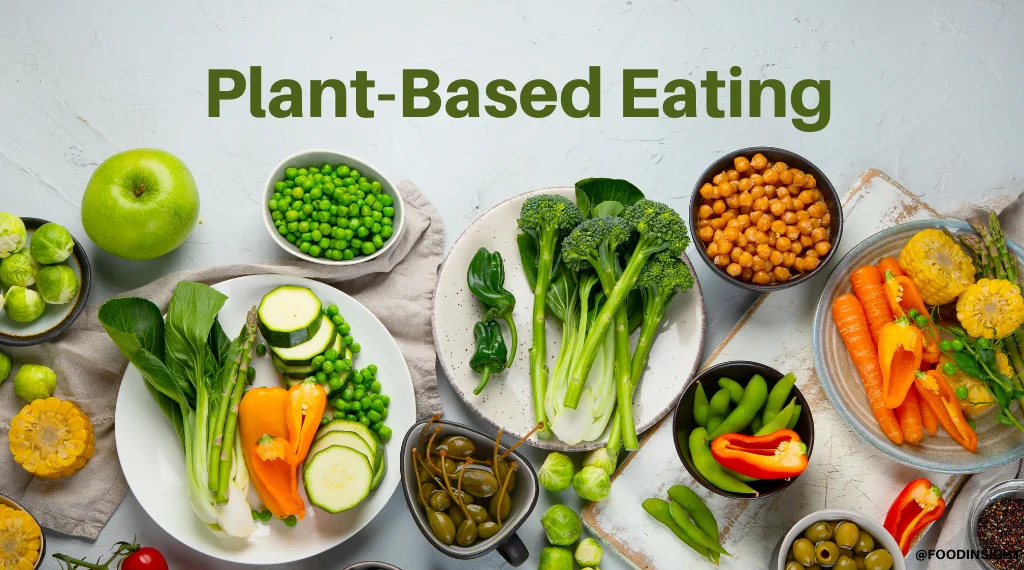Everything About Healthy Food: Advantages of Taking On Plant Based Choices
The conversation surrounding plant-based diet plans has gained significant attention in recent times. Many people are discovering the possible health and wellness benefits, nutritional benefits, and ecological effects related to these dietary choices. As individuals end up being much more conscious of their food's influence on well-being and sustainability, inquiries emerge regarding the functionalities of adopting such a way of living. What certain modifications can one expect, and just how might these options reshape not just personal health yet likewise the earth's future?
Comprehending Plant-Based Diets
Although many individuals associate plant-based diet plans mainly with vegetarianism or veganism, these diet regimens can encompass a wide variety of eating patterns that focus on whole, minimally refined plant foods. Such diet plans often consist of fruits, veggies, whole grains, seeds, nuts, and vegetables, while eliminating or limiting animal products. This versatility allows people to customize their dietary choices according to nutritional demands and personal preferences. Some might take on a largely plant-based diet plan while still occasionally consuming meat or dairy, often referred to as a flexitarian technique. The emphasis stays on including more plant foods, which can result in a varied array of flavors and meals. Comprehending these various interpretations of plant-based consuming is essential for valuing its ease of access and allure in modern food society.
Health Perks of Plant-Based Foods
The wellness benefits of plant-based foods are significant, providing a nutrient thickness benefit that sustains overall wellness. Study shows that these foods can improve heart wellness and play a crucial function in reliable weight administration. By incorporating much more plant-based choices, people may enhance their dietary choices and advertise long-lasting health and wellness.
Nutrient Thickness Advantage
Nutrient thickness plays a vital duty in the wellness advantages of plant-based foods, making them an engaging choice for those seeking a balanced diet. Plant-based foods, such as fruits, veggies, legumes, nuts, and whole grains, are typically rich in vital vitamins, minerals, and antioxidants while being lower in calories. This high nutrient density allows people to eat fewer calories while still meeting their nutritional demands. In addition, these foods are packed with dietary fiber, promoting digestive wellness and assisting in weight monitoring. By integrating nutrient-dense plant-based choices, consumers can improve their general health and wellness, support their body immune systems, and decrease the threat of persistent diseases. Ultimately, the nutrient thickness of plant-based foods highlights their relevance in a health-conscious way of living.
Heart Health Enhancement

Weight Administration Assistance
Along with advertising heart health and wellness, a plant-based diet plan can significantly assist in weight monitoring. This dietary method highlights entire foods such as fruits, vegetables, beans, nuts, and whole grains, which are generally lower in calories and higher in fiber compared to animal-based items. The high fiber web content assists enhance satiety, decreasing overall calorie consumption. Moreover, plant-based diet plans are commonly rich in essential nutrients while low in undesirable fats, making it simpler to keep a healthy and balanced weight. Sugar Free Sauces. Research study shows that people that adopt a plant-based lifestyle often tend to have reduced body mass indexes (BMIs) and experience even more effective weight management compared to those that eat meat-heavy diets. Consequently, welcoming plant-based choices is a strategic option for reliable weight administration
Nutritional Worth of Plant-Based Components
Plant-based components are rich in necessary nutrients, using a diverse variety of vitamins, minerals, and anti-oxidants that add to general wellness. A contrast of healthy protein sources reveals that while animal products are often seen as superior, several plant-based options provide ample protein and various other helpful substances. Understanding the dietary worth of these active ingredients can assist people pop over to these guys make notified dietary options.
Vital Nutrients in Plants
Nutrient-rich active ingredients discovered in plants provide a diverse variety of important vitamins and minerals that contribute greatly to overall health. These components are abundant in vitamins A, C, and K, which sustain immune feature, vision, and blood clotting, respectively. On top of that, plants offer essential minerals such as calcium, potassium, and magnesium, crucial for heart health, muscular tissue function, and bone strength. The presence of fiber in plant-based foods aids food digestion and advertises a healthy and balanced intestine microbiome. Anti-oxidants, located abundantly in vegetables and fruits, aid battle oxidative stress and minimize inflammation. Lots of plant foods are reduced in calories yet high in nutrients, making them an exceptional selection for those looking for to maintain a healthy weight while making sure optimal nutrient intake.

Contrasting Protein Resources
Protein go now sources differ substantially in their dietary accounts, with plant-based active ingredients offering distinct benefits. Unlike animal healthy proteins, which usually include hydrogenated fats and cholesterol, plant proteins have a tendency to be reduced in these undesirable elements. Legumes, nuts, seeds, and whole grains are abundant in vital amino acids, fiber, vitamins, and minerals. For example, lentils offer high healthy protein web content together with substantial iron and folate, while quinoa is a complete healthy protein, providing all 9 essential amino acids. Furthermore, plant-based healthy proteins are commonly gone along with by antioxidants and phytochemicals that sustain overall wellness. The change to plant-based protein resources not only improves dietary intake but additionally straightens with sustainable dietary practices, minimizing environmental influence and advertising long-lasting wellness benefits.
Ecological Influence of Plant-Based Eating
As understanding of environment adjustment grows, numerous people are checking out lasting nutritional options that can considerably reduce their environmental impact. Plant-based consuming has become a substantial contributor to decreasing greenhouse gas emissions, which are largely associated with animals manufacturing. The growing of fruits, vegetables, grains, and legumes generally calls for less resources, such as water and land, contrasted to pet farming. In addition, plant-based diet plans can cause lowered deforestation, as less land is required for grazing livestock or expanding pet feed. By changing in the direction of plant-based options, consumers can support biodiversity and promote healthier ecological communities. In general, accepting plant-based consuming not just advantages individual wellness yet additionally stands for a vital step toward environmental sustainability and conservation efforts.
Overcoming Common Misconceptions
While many individuals recognize the benefits of a plant-based diet, several mistaken beliefs commonly hinder them from totally welcoming this lifestyle. An usual idea is that plant-based diet regimens do not have adequate protein; however, numerous plant resources, such as beans, nuts, and tofu, supply adequate protein. Additionally, some assume that this diet regimen is pricey, when as a matter of fact, staples like beans, rice, and seasonal vegetables can be quite budget-friendly. One more mistaken belief is that plant-based eating is overly limiting, whereas it really provides a varied variety of flavors and foods. Lots of worry that a plant-based diet regimen may lead to deficiencies, yet with proper planning, individuals can obtain all needed nutrients, consisting of minerals and vitamins, while taking pleasure in a vast range of delicious dishes.
Tips for Transitioning to a Plant-Based Lifestyle
Making the shift to a plant-based lifestyle can be an enhancing experience, though it typically calls for some support to navigate the preliminary changes. Initially, people are motivated to begin gradually, integrating more fruits, vegetables, beans, and entire grains right into their dishes while lowering meat and milk consumption. Dish preparation is important; preparing a regular food selection can aid reduce the adjustment and prevent last-minute unhealthy choices. Exploring new recipes and cooking methods can additionally enhance the experience and preserve enjoyment concerning plant-based consuming. In addition, joining support groups or communities can offer motivation and share useful ideas. Ultimately, remaining educated concerning nourishment warranties well balanced dishes, protecting against shortages while cultivating a healthy and balanced, satisfying plant-based lifestyle.
Delicious Plant-Based Meal Concepts
Discovering delicious plant-based dish ideas can inspire people to welcome an extra healthy diet regimen. One preferred option is a passionate quinoa salad, including cherry tomatoes, cucumber, and a vibrant lemon-tahini clothing. Another fave is a mouthwatering lentil stew, loaded with carrots, celery, and fragrant herbs, ideal for a comforting dinner. For breakfast, over night oats made with almond milk, chia seeds, and covered with fresh berries give a nutritious start to the day. Additionally, a lively vegetable stir-fry with tofu and a variety of vivid veggies can be a fast yet satisfying dish. Creamy avocado toast on whole-grain bread, sprayed with seeds and seasonings, provides a straightforward yet savory treat. These meals showcase the range and richness of plant-based eating.

Often Asked Inquiries
Can a Plant-Based Diet Plan Give Sufficient Healthy Protein?
The question of whether a plant-based diet regimen can supply enough protein is common. Countless resources, consisting of vegetables, nuts, seeds, and entire grains, can fulfill healthy protein requires properly, sustaining a nutritious and well balanced diet regimen for individuals.
Are Plant-Based Diet Regimens Ideal for Children?
The viability of plant-based diet plans for kids depends upon careful preparation. Sufficient nutrients have to be assured, including minerals, vitamins, and proteins. With proper assistance, such diet regimens can support healthy development and development in children.
Exactly how Do I Eat in restaurants on a Plant-Based Diet plan?
Dining out on a plant-based diet plan entails seeking restaurants with varied food selections, requesting for adjustments, and discovering vegan-friendly options. Preparation in advance and communicating nutritional choices can enhance the dining experience while maintaining nutritional choices.
What Prevail Allergens in Plant-Based Foods?
Common irritants in plant-based foods include soy, gluten, nuts, and seeds - Plant Based Chicken. Individuals complying with a plant-based diet plan should know these allergens and review tags carefully to avoid negative reactions and ensure secure usage
Can Plant-Based Diets Aid With Weight Loss?
Research study suggests that taking on a plant-based diet might visit here help with weight reduction because of its generally lower calorie density and higher fiber material. This combination can enhance satiety, assisting individuals handle their caloric consumption efficiently. Numerous individuals connect plant-based diet plans mostly with vegetarianism or veganism, these diet regimens can encompass a vast array of consuming patterns that focus on whole, minimally processed plant foods. Nutrient thickness plays an important function in the health and wellness benefits of plant-based foods, making them a compelling choice for those seeking a balanced diet plan. Plant-based diet plans have been shown to considerably enhance heart health and wellness, as they frequently include elements that support cardiovascular function. In enhancement to promoting heart health, a plant-based diet can substantially help in weight monitoring. A typical idea is that plant-based diet regimens do not have adequate protein; nevertheless, various plant resources, such as beans, nuts, and tofu, provide enough protein.